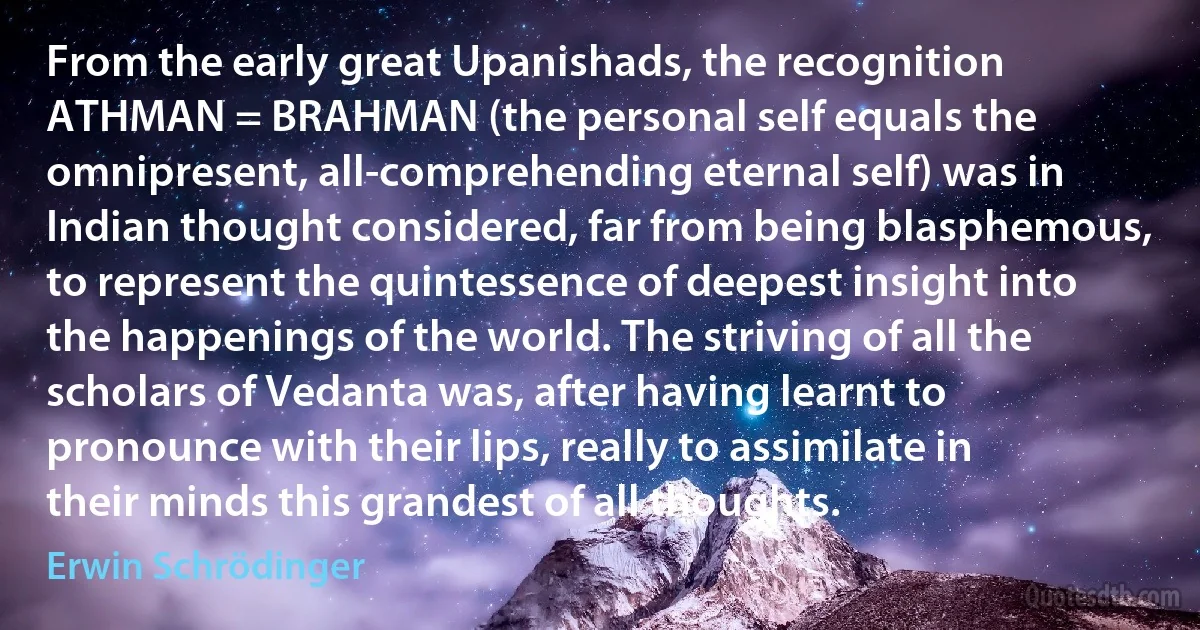Recognition Quotes - page 29
The failure in public and in private life thus to treat each man on his own merits, the recognition of this government as being either for the poor as such or for the rich as such, would prove fatal to our Republic, as such failure and such recognition have always proved fatal in the past to other republics. A healthy republican government must rest upon individuals, not upon classes or sections. As soon as it becomes government by a class or by a section, it departs from the old American ideal.

Theodore Roosevelt
Caste has no foothold in Santo Domingo. It is capable of supporting the entire colored population of the United States, should it choose to emigrate. The present difficulty, in bringing all parts of the United States to a happy unity and love of country grows out of the prejudice to color. The prejudice is a senseless one, but it exists. The colored man cannot be spared until his place is supplied, but with a refuge like San Domingo his worth here would soon be discovered, and he would soon receive such recognition to induce him to stay; or if Providence designed that the two races should not live to-gether he would find his home in the Antilles.

Ulysses S. Grant
Hegel is (unknowingly) an admirable 'theoretician' of ideology insofar as he is a 'theoretician' of Universal Recognition who unfortunately ends up in the ideology of Absolute Knowledge. Feuerbach is an astonishing 'theoretician' of the mirror connexion, who unfortunately ends up in the ideology of the Human Essence. To find the material with which to construct a theory of the guarantee, we must turn to Spinoza.

Baruch Spinoza
The appearance of Spinoza, however, fundamentally changes the entire religious picture in the West. He emancipated philosophy from theology and taught man to think in metaphysical and universalistic rather than in theological and individualistic terms. He distinguished between the functions of recognition and piety. The aim of philosophy he says is truth, the recognition of things in their connection with one another and with God. The aim of theology is piety obedience to God's laws. Hence, there is but little difference between the Old and the New Testaments, for both, like all theology, have a content apart from recognition. They teach certain doctrines, such as a personal God, His attributes, His relationship to the world, His moral ends, the aim of creation, etc. As practical piety, even the theological content of the Bible is acceptable, but as theoretical philosophy or as objective truth it must be rejected.

Baruch Spinoza
When we began our race for the presidency in April 2015, we were considered by the political establishment and the media to be a "fringe" campaign, something not to be taken seriously. After all, I was a senator from a small state with very little name recognition. Our campaign had no money, no political organization, and we were taking on the entire Democratic Party establishment. And, by the way, we were also running against the most powerful political operation in the country. The Clinton machine had won the presidency for Bill Clinton twice and almost won the Democratic presidential nomination for Hillary Clinton in 2008. When our campaign finally came to a close in July 2016, it turned out that the pundits had got it wrong-big-time. We had made history and run one of the most consequential campaigns in the modern history of the country-a campaign that would, in a very profound way, change America.

Bernie Sanders
Today I would like to thank from my heart all those of you who have trusted me, sympathized with me or in any way supported me. Without your understanding and goodwill I would not have been able to stay in office for even a few moments. I appreciate your support all the more for the fact that I did not try at all costs to obtain it. I frequently even took what was clearly a minority position and so reaped more opposition than recognition. Sometimes I may have been mistaken in this but I would like to assure you of one thing: I have always tried to abide by the dictates of the authority under which I took my oath of office - the dictates of the best of my awareness and conscience.

Václav Havel
Ramakrishna possessed a deep aversion to formal learning and education. Learned persons were likened by him to kites and vultures, which soar to great heights in the sky but whose eyes are forever focused on the decaying carcasses below. They were also described as similar to foolish people in an orchard who count the leaves and fruit and argue to estimate their value instead of plucking and relishing the juicy fruit. Reason and the intellectual life received little attention or recognition in his teachings.

Anantanand Rambachan
While I too may be wrong about North Korea's intentions, I'm neither lying nor guessing. Granted, it's not easy figuring out what any country wants. America? Damned if I know anymore. The beginning of political wisdom is the recognition that no government's discourse can be trusted. That goes also for the regime our softliners consider uniquely guileless. And the beginning of I.R. wisdom is the realization that foreign-service officials lie especially often. I had to laugh when I first heard of a news magazine called The Diplomat; it's like calling a porn magazine The Prude.

Brian Reynolds Myers
The meaning lies in the appropriation. Hence the book's joyous giving of itself. Here there are no worldly "mine” and "thine” that separate and prohibit appropriating what is the neighbor's. Admiration is in part really envy and thus a misunderstanding; and criticism, for all its justification, is in part really opposition and thus a misunderstanding; and recognition in a mirror is only a fleeting acquaintance and thus a misunderstanding-but to see correctly and not want to forget what the mirror is incapable of effecting, that is the appropriation, and the appropriation is the reader's even greater, is his triumphant giving of himself.

Søren Kierkegaard
Ninety-nine men in a hundred are natural men, that is, beasts of prey; and it is mere insanity, in business matters, to deal with a stranger upon any other assumption than that he is a natural man, though we should veil our knowledge of the actual fact by a courteous recognition in words and manners of his better possibilities.

Coventry Patmore
The recognition that love represents the highest morality was nowhere denied or contradicted, but this truth was so interwoven everywhere with all kinds of falsehoods which distorted it, that finally nothing of it remained but words. It was taught that this highest morality was only applicable to private life - for home use, as it were - but that in public life all forms of violence - such as imprisonment, executions, and wars - might be used for the protection of the majority against a minority of evildoers, though such means were diametrically opposed to any vestige of love.

Leo Tolstoy
This book contains quite a few references to Nazi Germany, and there is a tendency for many people to discount such comparisons because they are so overused and often in simplistic and inappropriate ways. I am no less tolerant of such facile uses of a horrific set of events; and I find their overuse an insult to the memories of the victims. But I am using it rather extensively in this book precisely because the parallel is appropriate, certainly in the similar end foreseen by Islamists for Bengali Hindus and Nazis for Jews. If that recognition awakens the world to action, then this will be one of the most important uses of the comparison since World War II. (6-7)

Richard Benkin
Hardly a word about the condition of women is heard. Not a single statement about the fate of minorities, some of whose members have contributed to the independence of their country at the risk of their life; not a sign of recognition. On the contrary, they most often find themselves being gradually eliminated from the country's civil-service bureaucracy. In this way a great occasion is lost to build, at least in words, an open and multicultural nation, one that includes the Algerian Kabyles, the Egyptian Copts, Jews and Christians ... precisely what intellectuals living in the West demand for themselves in their host countries!

Albert Memmi
Those who cherish their freedom and recognize and respect the equal right of their neighbors to be free and live in peace must work together for the triumph of law and moral principles in order that peace, justice, and confidence may prevail in the world. There must be a return to a belief in the pledged word, in the value of a signed treaty. There must be recognition of the fact that national morality is as vital as private morality.

Franklin D. Roosevelt
The mood and temper of the public in regard to the treatment of crime and criminals is one of the most unfailing tests of the civilisation of any country. A calm and dispassionate recognition of the rights of the accused against the State, and even of convicted criminals against the State, a constant heart-searching by all charged with the duty of punishment, a desire and eagerness to rehabilitate in the world of industry all those who have paid their dues in the hard coinage of punishment, tireless efforts towards the discovery of curative and regenerating processes, and an unfaltering faith that there is a treasure, if you can only find it, in the heart of every man-these are the symbols which in the treatment of crime and criminals mark and measure the stored-up strength of a nation, and are the sign and proof of the living virtue in it.

Winston Churchill
I have spoken of the forces of which judges avowedly avail to shape the form and content of their judgments. Even these forces are seldom fully in consciousness. They lie so near the surface, however, that their existence and influence are not likely to be disclaimed. But the subject is not exhausted with the recognition of their power. Deep below consciousness are other forces, the likes and the dislikes, the predilections and the prejudices, the complex of instincts and emotions and habits and convictions, which make the man, whether he be litigant or judge.

Benjamin N. Cardozo
Prem Rawat has received widespread recognition for providing inspiration and guidance to audiences around the world on tonight's topic for peace. Proclamations and resolutions that honor his work: keys to the City, letters of appreciation, invitations from government officials, and these are among the many ways that he's been welcomed throughout the years. We're used to hearing about peace as the absence of war. We normally put the responsibility of peace on governments and on political organizations. We seldom talk about peace from a human-from our own-perspective. We seldom highlight the important role of each human being, each one of us, in bringing peace to the world. Tonight, we hear Prem Rawat's fresh and innovative views on peace.

Prem Rawat
The worldwide dangers of war, famine, cults of personality, and bureaucracy - these are perils for all of mankind.
Recognition by the working class and the intelligentsia of their common interests has been a striking phenomenon of the present day. The most progressive, internationalist, and dedicated element of the intelligentsia is, in essence, part of the working class, and the most advanced, educated, internationalist, and broad-minded part of the working class is part of the intelligentsia.

Andrei Sakharov



